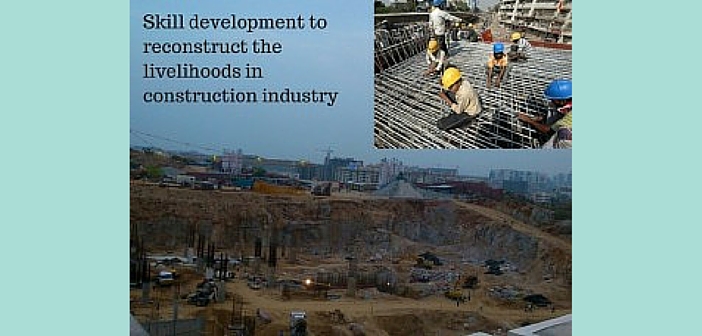Skill development for construction workers is something as basic as the need for housing and infrastructure. Not fulfilling this primary need will not only impact the quality of construction, but most importantly, the livelihood of workers.
The place where I live is surrounded by huge construction projects, undertaken by reputed builders. The projects underway are at different stages: digging, rock blasting, quarrying, concreting, laying the foundation with pillars, – the sites are buzzing with activity throughout the day and night, 24X7X365. The good thing about these projects is that they are professionally organized, equipped with proper care for safety of workers and other staff. You will not see anyone without a helmet on the site and all the blasting is preceded by sirens that warn. And the workers are formally trained in different skills like masonry, bar bending, tiling and so on. I’m sure their lives are far better than millions of other construction workers who do not safe and secure means of livelihood, even though they toil hard in the unorganized sector.

According to a survey conducted in 2013:
*45 million construction workers form the country’s third largest employee base and fall in the unorganised or informal sector
*Only 23% construction workers are registered with welfare boards across the country
Construction industry comes next to agriculture in providing jobs in India; though it is the second largest source of livelihood, it is highly informal and unorganized, with unskilled and semi-skilled workers. These workers, mostly migrants, fall into the trap of contractors and middlemen and lose their jobs and a decent life. The only way to reconstruct their lives is by training them in functional skills and equipping them with safety and health information at the earliest. In fact, such intervention can be effectively carried out on the construction premises itself with bare minimum infrastructure.
Another typical aspect of these workers pertains to the knowledge they would have acquired informally, prior to the formal training. Recognition of previous knowledge and skills helps them move fast with skill updation. There are various means of assessing their prior learning in order to include them in the mainstream workforce and give them the benefits of formal continuous employment.
It’s quite a formidable task to train millions of workers to make them industry-ready. Construction academies and other organizations in Public-Private-Partnership (PPP) are already trying to fill the pipeline with trained workers. Following are some steps that could taken to make the training interventions successful:
•Assess their informal learning and provide suitable training to speed up the process and make the workers feel good about their previous knowledge and skills
• Include a component on confidence building, negotiation skills and the relevance of basic finance and safety, health and environment
• Conduct the practical and technical training with latest tools and technology that reduces risks and hazards in their daily tasks on site
• Create modules that can lead to continuous learning and enhance the employability quotient while certifying according to NSQF
• Provide opportunities to enrol in social security schemes by educating them about the significance of banking and insurance
If we wish to have world class infrastructure and meet global standards, isn’t it essential to embark on as many training programs as possible to include all the construction workers and improve their lives.












